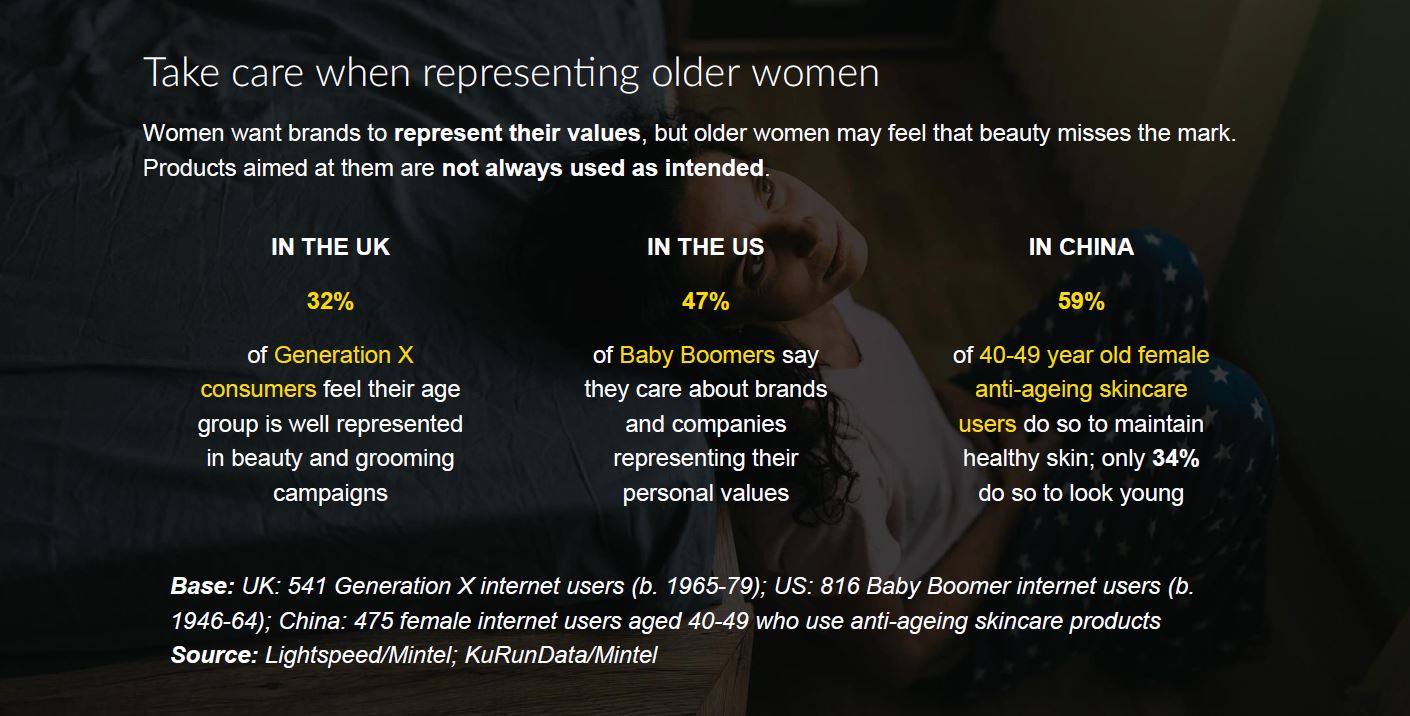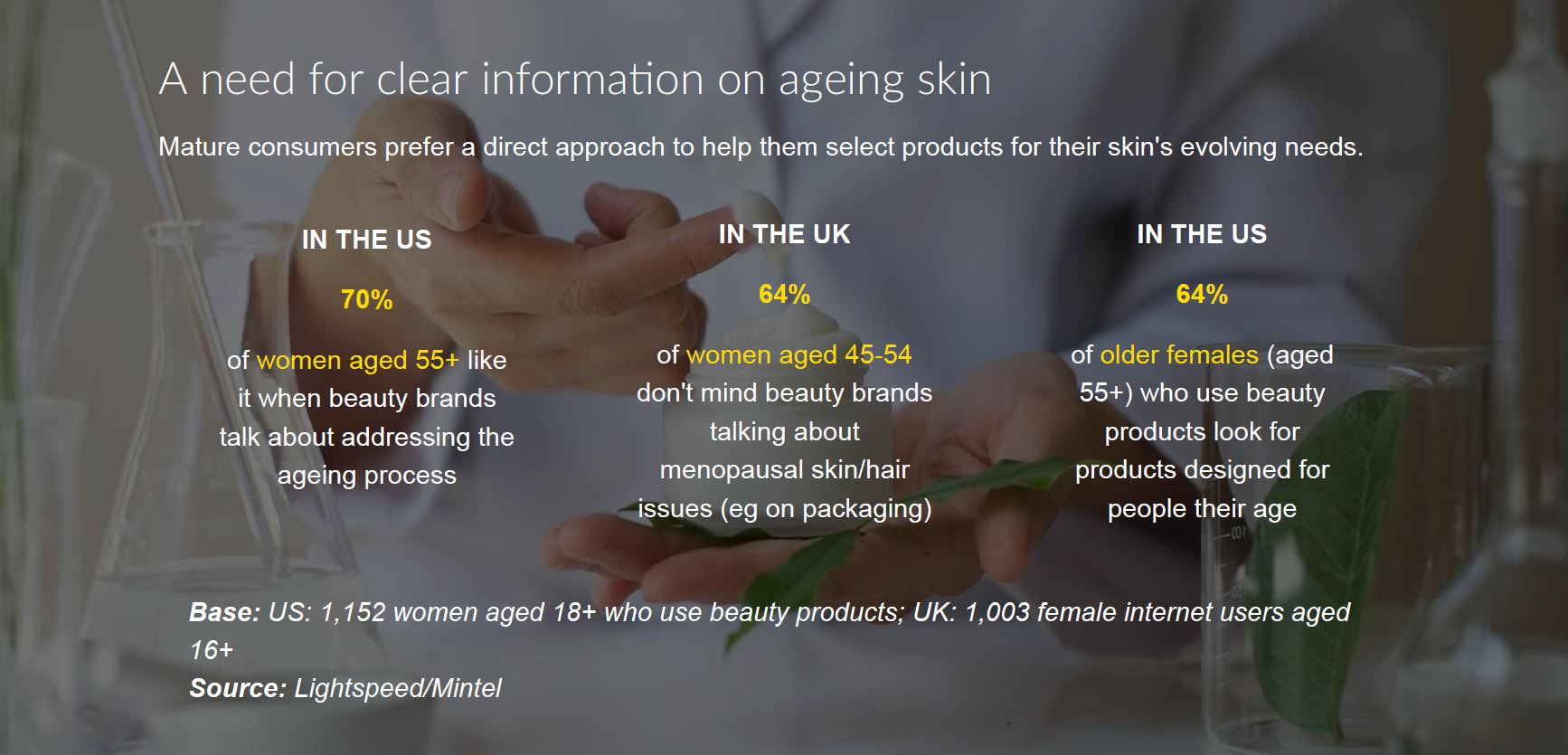We all want to look and feel great as we age. After all, retirement is the ultimate toast to life, when we enjoy what we’ve earned from all the years of work.
When consumer brands target a new generation, it’s usually the next generation of younger individuals. But mature women today are changing that “age-old” approach. Move over, millennials. Maybe you’ll be this cool when you grow up, Gen Zers. The “elastic generation” is taking the beauty industry by storm. Wunderman Thompson, which coined the term, explains:
“Women in their 50s, 60s and early 70s are active, engaged and involved. Pillars of family, community and society, nothing they do is motivated by their age. It’s time for brands to take age out of the equation.”

The elastic generation is breaking every stereotype in the book. In the process, they’re opening beauty brand marketers’ eyes to a few crucial culture shifts.
1. Age-Inclusive Marketing
Surveying 248 UK women ages 53 to 72, Wunderman Thompson found that nine out of 10 women wanted advertisers to treat them as people instead of stereotypes. Additionally, 67% of respondents said they believe advertisers only care about young people. Meanwhile, a previous study showed 78% of women over the age of 50 control most of the purchase decisions in their household. They also buy more beauty products than younger women. Still, brands often feature younger women seemingly exclusively in advertising—or they overcorrect to ages 60-plus.

The population of women over 55 will continue to grow globally in the years ahead, giving brands an opportunity to make up for lost time. Just, please, don’t patronize the elastic generation; these women are tech-savvy, travel-ready and, as Wunderman Thompson writes, “reinventing life past fifty, as they forge the path others will follow.”
2. Authentic Aging
Not only have brands been overlooking a key audience; they’ve also been missing the mark in the sparse communications they do make to that audience.
“Our collective understanding of what later life looks like remains woefully outdated,” one Wunderman Thompson executive said. “Age no longer dictates the way we live. The women of the ‘Elastic Generation’ are at the vanguard of this change, which is creating possibilities for brands to better meet their needs and support their ambitions.”

The elastic generation views aging through the lens of beauty and grace, with their maturity bringing confidence rather than discontent. It’s not about anti-aging anymore. Mintel explains the simple logic behind its research supporting the concept of authentic aging:
“Taking care of one’s appearance is linked to feeling more confident and looking healthier – as such, mature skincare should be positioned as one element of an overall wellbeing strategy for older consumers.”
When it comes to skin care offerings for common signs of aging such as wrinkles, Mintel says “brands should do more to explain how their products help support mature skin as it changes with the aging process,” as opposed to simply combatting the visual cues.
3. The Personal (Care) Journey
According to Mintel, 70% of women in the U.S. ages 55+ appreciate when brands talk about the aging process. In the UK, nearly as many (64%), say they don’t mind directly addressing the more personal aspects of aging, like menopause, on product packaging. And remember, the perspectives are changing. Mintel encourages brands to forget old stereotypes, create an open dialogue and consider the hormonal skin effects when marketing products around menopause.
“It’s crucial that brands adapt to the generation they cater for, rather than trying to make them feel younger,” Mintel says. “In the UK, 35% of Generation X consumers do not take inspiration from what BPC products younger consumers are using, so give them their own brands and products.”
In all of the above, marketing and messaging are only as powerful as the ingredients and formulas will allow. See how Sensient is helping brands cater to the fierce and fabulous women of the elastic generation here.








